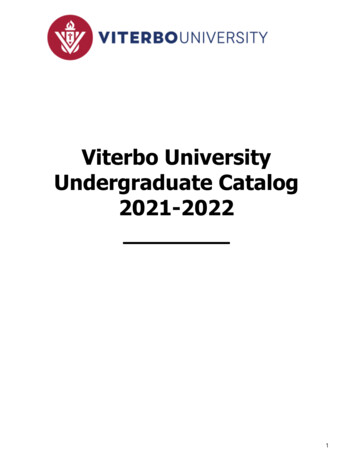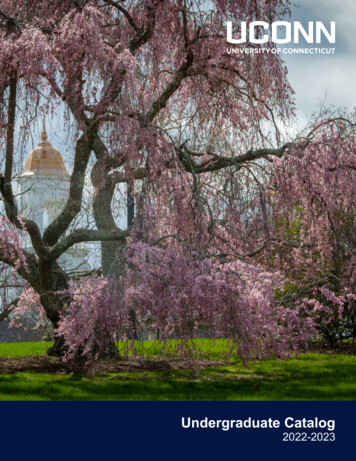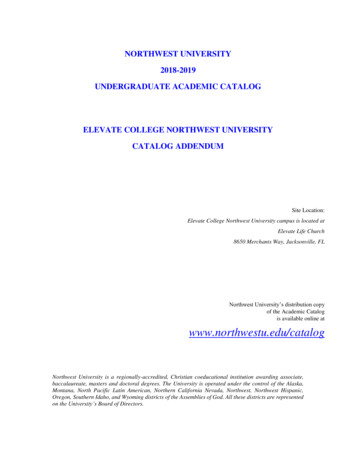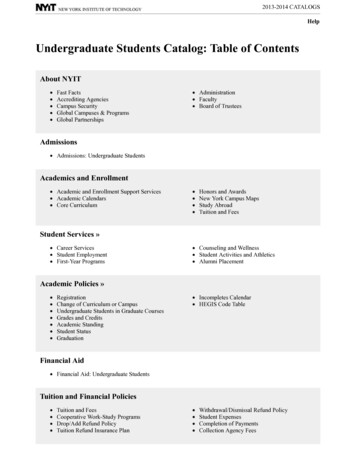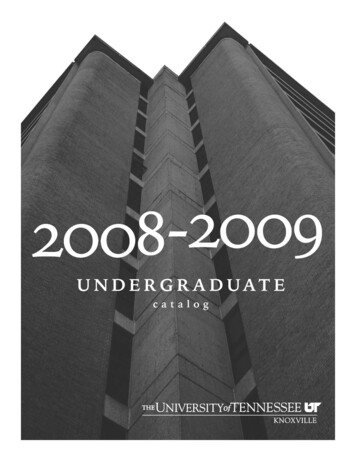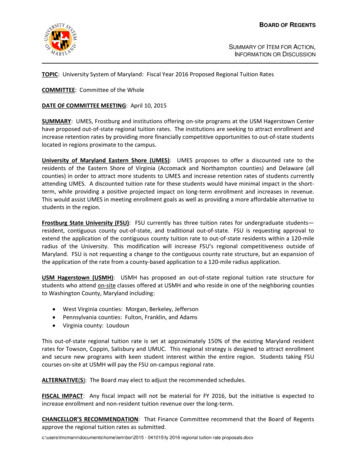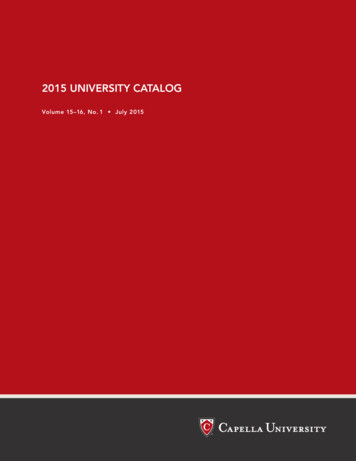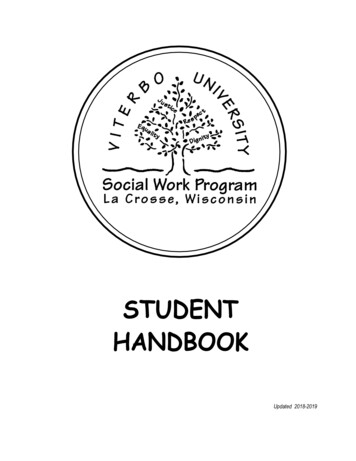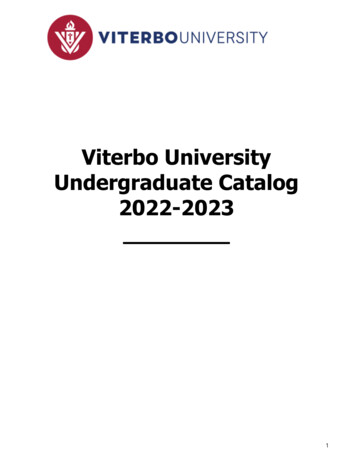
Transcription
Viterbo UniversityUndergraduate Catalog2022-20231
TABLE OF CONTENTSpageGeneral Information3Undergraduate Admission4Student Life8Financial Aid and Tuition8Academic Services8Academic Regulations and Policies9Core Curriculum31Degree Requirements and Graduation35Bachelor Degree Programs38Other Undergraduate Programs145Course Descriptions149Directory263Faculty Emeritus271Academic Calendar273Viterbo University is accredited by the Higher Learning Commission (hlcommission.org), an institutional accreditation agencyrecognized by the U.S. Department of Education. 230 South LaSalle Street, Suite 7-500, Chicago, Illinois 60604-1411, 800-6217440; 312-263-0456; info@hlcommission.org.Viterbo University is registered with the Iowa College Student Aid Commission to offer programs via face to face and distanceeducation delivery to Iowa residents.Viterbo University is registered as a private institution with the Minnesota Office of Higher Education pursuant to MinnesotaStatues, sections 136A.61 to 136A.71. Registration is not an endorsement of the institution. Credits earned at the institution maynot transfer to all other institutions.It is the policy of Viterbo University not to discriminate against students, applicants for admission, or employees on the basis ofsex, race, color, religion, national origin, ancestry, age, sexual orientation, or physical or mental disabilities unrelated toinstitutional jobs, programs, or activities. Viterbo University is a Title IX institution.This catalog does not establish a contractual relationship. Its purpose is to provide students with information regardingprograms, requirements, policies, and procedures to qualify for a degree from Viterbo University. Viterbo University reserves theright, through university policy and procedure, to make necessary changes to curriculum and programs as educational andfinancial considerations may require.A student follows the curricular requirements in the catalog in effect at the time of entry (as a new degree seeking student) andduration of attendance at Viterbo provided attendance is uninterrupted and a degree is completed within a period of six years.All academic policy and course additions/revisions will apply to all students as of the date they become effective, regardless ofwhether they were in effect at the time the student initially enrolled at Viterbo.The university catalog is normally revised every year and changes are announced. When changes occur, either the original or themost recent catalog may be followed.2
GeneralInformationAccreditation and ApprovalsViterbo University and its programs are accredited by: The Higher Learning Commission; 30 North LaSalle Street, Suite 2400, Chicago, IL 60602-2504;800-621-7440; www.ncahigherlearningcommission.orgAmerican Chemical Society (ACS);1155 Sixteenth St. NW, Washington, DC 20036; 1-800-3339511; http://www.acs.orgAmerican Society of Biochemistry and Molecular Biology (ASBMB); 11200 Rockville Pike, Suite302, Rockville, MD 20852; 240-283-6600; http://asbmb.orgAccreditation Council for Business Schools and Programs (ACBSP); 11520 West 119th Street,Overland Park, KS 66213, (913) 339-9356; www.acbsp.orgAccreditation Council for Education in Nutrition and Dietetics (ACEND); 120 South RiversidePlaza, Suite 2190, Chicago, IL 60606-6995; 800-877-1600, ext. creditedprograms.aspxCommission on Collegiate Nursing Education (CCNE); 655 K Street NW, Suite 750; WashingtonDC, 20001; 202-887-6791; http://www.ccneaccreditation.orgCouncil for Accreditation of Counseling and Related Educational Programs (CACREP); 500Montgomery Street, Suite 350, Alexandria, VA, 22314; 703-535-5990; http://www.cacrep.orgCouncil on Social Work Education (CSWE); 1725 Duke Street, Suite 500, Alexandria, VA 223143457; 703-683.8080; http://www.cswe.org/National Association of Schools of Music (NASM); 11250 Roger Bacon Drive, Suite 21, Reston, VA20190-5248; 703-437-0700; http://nasm.arts-accredit.orgThe nursing program is approved by the Wisconsin State Board of Nursing for the licensure ofregistered nurses.The substance abuse counseling program is approved by the State of Wisconsin’s Department of Safetyand Professional Services as a pre-certification education program for Substance Abuse Counselorcertification in the state of Wisconsin.The social work program is recognized by the Wisconsin Department of Safety and ProfessionalServices, Board of Marriage and Family Therapists, Professional Counselors, and Social Work as anaccredited program that prepares students to apply for Certified Social Worker credential in the state ofWisconsin. The accreditation is also recognized by American Social Work Boards for credentialing in theUnited States.The education program is recognized by the Wisconsin Department of Public Instruction for thecertification of teachers in the elementary and secondary schools and for the training of veterans.Viterbo University is recognized and approved by the Iowa College Student Aid Commission to offerdegree programs in education.Viterbo University is recognized and approved by the Iowa State Board of Education for the K-12Principal licensure/Supervisor of Special Education documents/2014-5-15%20Viterbo%20Tab%20M.pdf)Degree and Other OfferingsViterbo University offers the following undergraduate degrees: Associate of Science in Education (for current Viterbo education students)Bachelor of Art EducationBachelor of ArtsBachelor of Business AdministrationBachelor of Fine Arts3
Bachelor of MusicBachelor of ScienceBachelor of Science in Community-Medical DieteticsBachelor of Science in EducationBachelor of Science in NursingPre-And Post-Professional Programs Pre-Art Therapy, Chiropractic, Dentistry, Law, Medicine, Occupational Therapy, Optometry,Pathologist’s Assistant, Pharmacy, Physical Therapy, Physician Assistant, VeterinaryCommunity Interpreting CertificateAccelerated Degree Programs Biology (three years)Graduate Programs Master of Arts in EducationMaster of Arts in Servant LeadershipMaster of Business AdministrationMaster of Science in Mental Health CounselingMaster of Science in Community-Medical DieteticsMaster of Science in School CounselingDoctor of EducationDoctor of Nursing PracticeDietetic InternshipFor further information on these programs and policies, students may refer to the university graduatecatalog.Mission, Vision, Identity – Core Values – HistoryCampus Facilities and GroundsStatement of Non-discriminationViterbo University values diversity and seeks talented students, faculty, and staff from diversebackgrounds. Viterbo University does not discriminate on the basis of race, sex, sexual orientation,gender identity, religion, color, national or ethnic origin, age, disability, or veteran status in theadministration of educational policies, programs, or activities; admission policies; scholarship or loanawards; athletic, or other university administered programs or employment. The Office of HumanResources has been designated to handle inquiries regarding the non-discrimination policy and may becontacted at Viterbo University, 900 Viterbo Drive, La Crosse, WI 54601; 608-796-3930.UndergraduateAdmissionViterbo University welcomes applications for admission from all students who have prepared for acompetitive collegiate program. Admission to Viterbo University is offered to those for whom academicand personal success seems likely. Each candidate is evaluated indiv idually. Evidence of ability to docollege-level work is essential. All qualified students, regardless of sex, race, religion, color, national orethnic origin will be extended an offer of admission on a first come, first served basis as long as spaceremains available. Students will be evaluated f or admission in accordance with the general admissioncriteria stated below.General Admissions CriteriaViterbo University reserves the right to deny or place conditions on the admission, re-enrollment, or4
continued enrollment of any applicant, former student, or current student, who in the judgment of theuniversity officials has failed to maintain satisfactory academic progress, would be disruptive of theorderly process of the college’s programs, would interfere with the rights and privileges of otherstudents or employees, is not prepared to benefit from the course of study offered, or places a risk tothe safety or well-being of the campus community. The university may consider criminal, juvenile, anddisciplinary history in admission and enrollment decisions. Information submitted to Viterbo Universitymust be true, complete, and accurate. Withholding any pertinent information may result in denial ofadmission or dismissal.For Applicants with Acts, Crimes, or Offenses That May Prohibit or Restrict AdmissionApplicants for admission or re-admission with criminal or disciplinary records must disclose informationabout their prior records. Failure of the applicant to accurately and completely provide information andrecords may result in denial of admission, revocation of admission, or discipline, up to and includingpermanent dismissal from the university. Information to be disclosed includes: (1) criminal offenses,felonies, misdemeanors, pending criminal charges, and diversion agreements (2) adjudicateddelinquencies, (3) information on any behavior resulting in a suspension or expulsion from any highschool or post-secondary institution, (4) information about less than honorable discharges from themilitary, (5) housing facility evictions, (6) other pertinent offenses or violations.Certain affiliates associated with Viterbo require that students placed in their facility forclinical/internship/field placement experiences clear a criminal background check prior to placement.Students whose background check reveals criminal history may be prevented access to the clinical site,and as a result, the student will not have sufficient clinical experience to successfully complete theprogram. Additionally, licensing boards for certain professions including health care occupations maydeny the individual the opportunity to sit for an examination if an applicant has a criminal history.Fully qualified applicants for criminal and community justice, nutrition and dietetics, education, nursing,social work, and some other programs may be subject to a criminal background check conducted by anapproved outsourced agency, at the student's expense, at the point of admission to Viterbo Universityin addition to the point of admission into a professional coursework sequence.ProcedureA review committee will evaluate the application, the disciplinary and criminal history disclosure formand all explanatory materials, of any student who indicates any of the aforementioned convictions,charges, records, etc. Prior to making a decision on admission or re-enrollment, the review committeemay request additional materials from the applicant, including requesting the student pay for anapproved criminal background check, and/or conduct a phone interview with the applicant and/orrequest that the applicant appear before the review board to discuss their application, etc.The review committee may consult with academic departments regarding anticipated issues in findingclinical placements or sitting for licensing exams and will recommend admission or denial of admissionin one of three ways: (1) admit or re-enroll the applicant without conditions, (2) admit or re-enroll theapplicant with condition (i.e., restrictions on location or place, denial of option to live in universityhousing facilities, etc.), or (3) deny admission or re-enrollment of the applicant. Recommendations onadmission or re-enrollment will be forwarded from the review committee to the appropriate universityadministrator who will formally admit or deny admission to the applicant based on therecommendation from the committee. The recommendation of the review committee is final and notsubject to appeal. The review committee is typically comprised of the vice president for student affairs,the vice president for academic affairs, the vice president for enrollment management, and the directorof campus safety, or their respective designees.Criminal Convictions Occurring After University AdmissionStudents are required to disclose in writing to the vice president for student affairs criminal convictionsoccurring since completing the application for admission. This policy applies to all Viterbo University5
incoming and current students.Admission CriteriaAny student who does not meet one or more of the admission criteria will be referred to the director ofadmissions and/or the Viterbo University Admission Committee for further review and consideration.The admissions committee will offer a recommendation on the admission of the student, or ask foradditional information, which may include but is not limited to updated transcripts, test scores, personalstatement, letter of recommendation, phone, video, or in-person interview, or that the student come tocampus and take a Viterbo University placement test.Admission to Viterbo University does not equate with admission into every academic program. Manyprograms have additional requirements for admission as an incoming student or a continuing Viterbostudent, which may include performing arts auditions, art portfolio reviews, satisfactory prerequisitecoursework or background checks, etc. In these cases, additional steps and review may be required.Additionally, changes of an intended major or academic program may require a new admission reviewfor incoming students.Any student wishing to appeal an admission decision must notify the admissions office in writing.Additional information such an additional ACT or SAT score, updated transcript, letters ofrecommendation, etc., should be submitted for reconsideration.Freshman Admission for Traditional Daytime ProgramsA freshman is defined as a student entering college for the first time or a student who graduated fromhigh school in the same calendar year as the intended date of entry at Viterbo, but may have alreadytaken college courses at another institution.Freshman students will be considered for admission if they have received or are on track to receive theirhigh school diploma (or equivalent) prior to enrolling. If a student is deficient in GPA, test scores, orother program specific requirements, their file will be reviewed by our Admission Committee.Transfer Admission for Traditional Daytime ProgramsA transfer student is defined as any student with college credits from another institution who did notgraduate from high school in the same calendar year as the intended date of entry at Viterbo.Transfer students will be considered for admission as long as they have a cumulative GPA of at least2.25 on a 4.0 scale, are free to return to their previous college or university, and are considered to be ingood academic standing both at their previous school and at Viterbo University. Additional programspecific requirements may apply. If a student is deficient in one of these categories, their file will bereviewed by our Admission Committee.Bachelor Completion AdmissionApplicants must have earned an associate degree or 30 or more credits of applicable coursework from aregionally accredited institution, or be an accepted BSN Completion Pathways or BSN Completion Dualenrolled student. Students who have earned college credits from a regionally accredited institutionwithout a degree prior to enrolling at Viterbo must complete English composition, oral communication,and math competency for acceptance into a bachelor completion program. Students who have notpreviously completed these courses can work with a Viterbo admission counselor for assistance inmeeting these requirements.Bachelor completion programs are offered in blended or online formats. Bachelor completion studentswill be considered for admission as long as they have a cumulative GPA of at least 2.25 on a 4.0 scale.(Exception: Students applying to the professional phase of the social work major in the BachelorCompletion option need a minimum of a 2.5 GPA and a grade of B or better in the equivalent in SOWK210 Introduction to Social Work). Students admitted to a bachelor completion program who wish to6
change to a traditional undergraduate program must meet the general admission criteria to ViterboUniversity as well as any admission criteria specific to the traditional program.Alternative Credit/Transfer CreditSee the Academic Regulations section of the catalog for information on alternative means to earnedcredit, such as ACE, Advanced Placement, CLEP, DSST, International Baccalaureate, military training, orprior life/work experiences.See the Academic Regulations section of the catalog for information on Viterbo’s transfer credit policy.Reentry and ReadmissionRe-entry student information can be found on the Re-entry Admissions web page.International Student ent-admissionHigh School Students: Early College Credit ProgramViterbo University welcomes students in the Wisconsin Early College Credit Program. High schoolstudents who have not yet graduated and who have been pre-approved to take college coursework bytheir school district may attend Viterbo University on a space available basis at reduced per creditcharges and applicable course fees. Viterbo University will issue credit to students upon successfulcompletion of the course(s), with such credit being fully acceptable toward a bachelor’s degree. Thereduced per credit charge is available for fall or spring semesters only and may be paid in full by theschool district or in combination with the school district per state guidelines. Additional admissioncriteria may apply. High school students not approved by their district through the Wisconsin EarlyCollege Credit Program yet still choosing to enroll as a non-degree student in Viterbo coursework areresponsible for all costs associated with the coursework.High School Students: Diocesan High School College Credit ProgramViterbo University offers college credit to students enrolled in approved high schools. The course andhigh school instructor are approved for college credit by Viterbo University faculty. Viterbo Universitywill offer college credit for a maximum of five courses per high school per year. High school studentsmay take a maximum of three courses (total) of these Viterbo University approved courses at a reducedper credit charge.Non-degree-seeking StudentStudents desiring to audit or take selected courses for credit, but who do not expect to earn a degree atthis university, may be enrolled as a non-degree-seeking student. Complete transcripts of high schooland college records need not be submitted, but high school graduation, a GED, or its equivalent isrequired. Students may be admitted as a degree-seeking student at a later date. Students interestedshould complete the online student application at http://www.viterbo.edu/apply. Refer to the auditpolicy, in the academic regulations section of this catalog for the audit policy.Senior Citizen Enrichment ProgramPersons 62 years of age or older may audit selected undergraduate courses at no charge. This programis offered on a space-available basis. Since no grade is given the course cannot be converted to creditat some later date. This program is not available during the summer. To apply and register, completethe online application at http://www.viterbo.edu/apply.Continuing Education UnitsContinuing Education Units (CEUs) may be offered for some workshops with the understanding that at7
no time may these units be substituted for academic credits received in academic courses in the basicprograms. The CEU is defined to mean 10 contact hours of participation in an organized continuingeducation experience under responsible sponsorship, capable direction, and qualified instruction.Student LifeViterbo University’s Division of Student Life includes a wide range of departments, programs, andservices designed to facilitate students’ academic success, personal growth, leadership development,and social and community engagement. Please visit the Student Life web page to access a full listing ofStudent Affairs departmental websites and other important resources.Security/Student Right-to-Know and Campus Security ActViterbo University is in compliance with Public Law 101-542, the Student Right-to-Know and CampusSecurity Act. Information on the completion/graduation rate for full-time, degree seekingundergraduate students may be obtained from the registrar. Information on campus security and crimestatistics may be obtained from the director of security or from the campus safety website.Annual Security Report and Fire Safety Report can be found on the Student Services web page.Graduation rate of first time freshman can be found on the Institutional Research web page.Financial Aid andTuitionTuition and fees are set on a yearly basis. The university may set additional fees as needed. Studentspay for their own books and course materials. All expense items are subject to change.Business OfficeInformation about the following policies and information may be found on the Business OfficeWeb page. Viterbo University Bookstore -- Students are allowed to charge books to their account the firstweek of each semester, excluding summer session.Student Identification CardParkingPayment PolicyFederal Truth-in-Lending ActRefund PolicyFinancial Aid OfficeInformation about the following policies and information may be found on the Financial Aid Office Webpage. Aid EligibilityTypes of Financial AidFinancial Aid ToolsScholarshipsAcademic ServicesThe development of the whole person is the goal of the university experience for each student atViterbo University. This development occurs chiefly through an academic program conducted in ameaningful, growth-filled, Catholic, Franciscan environment.Viterbo University’s Academic Services includes a wide range of departments, programs and servicesincluding academic advising, academic early alert, academic resource center, career services, disabilityservices, library services, technology support, and the help desk. Please visit these departmentalwebsites to find many important resources.Academic8
Regulations andPoliciesAcademic calendarRegardless of delivery methods, the academic year is divided into two semesters, each 15 weeks inlength plus a final exam week. The summer session typically runs 14 weeks.Academic Forgiveness Policy for Reentry StudentsStudents who reenter Viterbo University after at least two years’ absence and whose cumulative gradepoint average is below a 2.5 at the time of re-entry may petition for academic forgiveness of previousViterbo coursework. This petition will be reviewed by the Academic Standing Committee, and convenedby the Director of Academic Advising, which will decide whether academic forgiveness will be granted.Academic forgiveness means that: All credits earned in semesters in which academic forgiveness is granted will be treated asearned or not earned, similar to grades of CR/NC, and will not count towards the student’s GPA.Grades of C or better translate to earned credits, whereas grades of CD or below translate to nocredit. Since all credits below a C are lost when academic forgiveness is granted, students shouldcarefully consider whether it is in their best interests to petition for academic forgiveness. Onceacademic forgiveness is granted, the decision is final. On the student’s transcript, all gradesearned prior to reentry will remain but be identified by the statement “academic forgivenesspolicy applied to the above.”A new cumulative GPA will begin from the semester of reentry to ViterboStudents who are granted academic forgiveness are eligible to graduate with academic honors;however, the original grades of the forgiven coursework will be used in the grade point average(GPA) calculation for academic honors.In order to be granted academic forgiveness a student must: Have been readmitted to Viterbo University and in been continuous attendance since reentryHave completed, since reentry, at least 16 but not more than 45 credits of graded courseworkHave an overall GPA of at least 2.0 since reentryApply to the Director of Academic Advising for academic forgiveness. The online form can befound on the Office of the Registrar webpage.A student will be granted academic forgiveness no more than once. The criteria for entry into specificprograms are independent of this policy.Academic IntegrityAll members of the Viterbo University community are expected to conduct themselves in an ethicalmanner and adhere to the highest standards of academic integrity. Furthermore, Viterbo Universitystudents are expected to adhere to a standard of academic honesty befitting their enrollment in thisCatholic Franciscan university. They will not engage in plagiarism, cheating, lying, or stealing, nor willthey tolerate those who do so. Fundamental to the principle of independent learning and professionalgrowth is the requirement of honesty and integrity in the conduct of one’s academic life. Academicdishonesty in any form is a serious offense against the academic community. Each academic programwill review the standards of academic integrity and have students acknowledge their acceptance of thestandards.Academic Integrity PolicyViterbo University students, faculty, and administration share the responsibility of maintaining astandard of academic honesty. The faculty must create an atmosphere in which students may displaytheir knowledge. This atmosphere includes sufficient safeguards to control dishonesty including anorderly testing room, restrictions on text messages, etc. Students are responsible for understanding andrefraining from academic misconduct.9
Academic Misconduct PolicyAcademic misconduct is any activity that may compromise the academic integrity of the university, orsubvert the educational process. Examples of academic misconduct include, but are not limited to: Violating course rules as contained in the course syllabus or other information provided to thestudent; violating program regulations as established by departmental committees and madeavailable to students;Knowingly providing or receiving information from others during examinations; or possessing orusing unauthorized materials during examinations;Knowingly providing or using assistance in the laboratory, on field work, in scholarship, or on acourse assignment when said work was to be completed individually;Submitting plagiarized work for an academic requirement. Plagiarism is the representation ofanother’s work or ideas as one’s own whether intentional or unintentional; it includes theunacknowledged paraphrasing or word-for-word use of another person’s work, and/or theinappropriate unacknowledged use of another person’s ideas. Each student is responsible forunderstanding plagiarism and the consequences of committing plagiarism. The ViterboUniversity library offers information about plagiarism and how it can be avoided. Viterbostudents are strongly encouraged to complete an online tutorial on avoiding plagiarism, which isavailable at www.indiana.edu/ istd.Submitting substantially the same work to satisfy requirements for one course or academicrequirement that has been submitted to satisfy requirements for another course or academicrequirement, without permission of either the instructor of the course for which the work is beingsubmitted or the supervising authority for the academic requirement;Falsifying or fabricating laboratory results, research results, or any other assignments;Serving as, or enlisting the assistance of a substitute for a student in the taking of examinations;Altering grades or marks in an effort to change the earned grade or credit;Altering university forms or records, or using such forms or records without authorization; orEngaging in activities that unfairly place other students at a disadvantage, such as taking, hiding,or altering resource material, or manipulating a grading system.A faculty member who suspects a student of academic misconduct shall follow these steps: Notify the student in writing of the allegation. Contact the program director (graduate program) and/or the department chair or dean ofthe college (undergraduate program) Contact the Vice President for Academics to notify that office that the student is involvedin an allegation of academic misconduct and to discover if the student has previouslyviolated the academic integrity policy.Procedures for Unintentional Violations of Academic Misconduct Policy (undergraduate/graduate)If the student has not previously committed academic misconduct, the faculty member shall determinewhether this academic misconduct is intentional or unintentional. Unintentional academic misconductoccurs when a student attempts to acknowledge, quote, and/or cite sources but does so inadequatelyor incorrectly. In determining if the misconduct is intentional or unintentional, the faculty member mayconsult with the student and/or program director. Students may have only one report of unintentionalacademic misconduct; more than one unintentional offense shall be treated as intentional academicmisconduct.If the faculty member determines that the misconduct is unintentional, the faculty member: Must provide a written warning that the continuation or repetition of academic misconduct willbe cause for additional disciplinary action; andMay award a failing grade on the assignment; orMay require the student to resubmit the corrected assignment or complete an alternativeassignment. The faculty member shall determine the grade for the resubmitted or alternateassignment.10
In determining the appropriate sanction, the faculty member shall consider all pertinent facts,
The nursing program is approved by the Wisconsin State Board of Nursing for the licensure of registered nurses. The substance abuse counseling program is approved by the State of Wisconsin's Department of Safety and Professional Services as a pre-certification education program for Substance Abuse Counselor certification in the state of .
